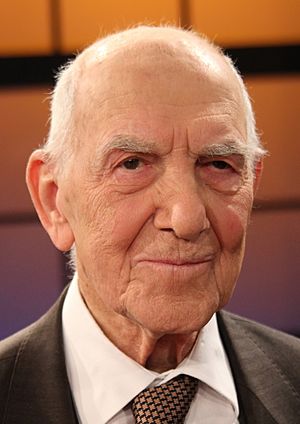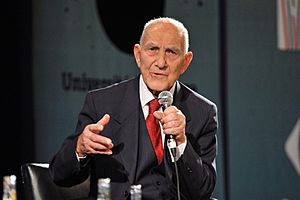Stéphane Hessel facts for kids
Quick facts for kids
Stéphane Hessel
|
|
|---|---|

Hessel, in 2012
|
|
| Born | 20 October 1917 |
| Died | 26 February 2013 (aged 95) Paris, France
|
| Citizenship | French |
| Occupation | Diplomat, ambassador |
| Years active | 1946–2013 |
| Known for | Human rights advocacy French Resistance member Buchenwald survivor |
|
Notable work
|
Time for Outrage! (Indignez-vous!) |
| Spouse(s) | Vitia Guetzevich (1939-1986; 3 children) Christiane Hessel-Chabry (1987-) |
| Parent(s) | Helen Grund Hessel Franz Hessel |
| Awards | Legion of Honour Ordre du Mérite North-South Prize UNESCO/Bibao Prize |
Stéphane Frédéric Hessel (1917–2013) was a French diplomat, writer, and a brave member of the French Resistance during World War II. He survived concentration camps and later became a strong voice for human rights.
Born in Germany, he became a French citizen in 1939. He helped observe the creation of the Universal Declaration of Human Rights in 1948. In his later years, Hessel spoke out against unfair differences in wealth and supported peace in the Israeli-Palestinian conflict. His short book, Time for Outrage!, became a worldwide bestseller. It inspired many protest movements around the globe.
Contents
Early Life and Education
Stéphane Hessel was born in Berlin, Germany, on October 20, 1917. His mother, Helen, was a journalist, and his father, Franz, was a writer. His parents' story even inspired characters in a famous novel and film called Jules and Jim.
Hessel moved to Paris, France, with his family in 1924. He was a very bright student, finishing high school at just 15 years old. In 1939, he became a French citizen. Soon after, he joined the French army.
World War II: A Member of the Resistance
When France was taken over by Germany in World War II, Stéphane Hessel refused to support the new French government. He escaped to London in 1941. There, he joined General Charles de Gaulle's French Resistance group. This group worked secretly against the German occupation.
Hessel became part of the Free French intelligence service. He went back to France to help set up communication networks for the Resistance. In 1944, he was captured by the German secret police, the Gestapo. He was sent to Buchenwald concentration camp and later to Dora concentration camp. He faced terrible treatment there.
Stéphane Hessel managed to escape execution at Buchenwald with the help of another prisoner. He also tried to escape from Dora. Later, he finally escaped during a transfer to another camp. He then met American soldiers who were advancing through Germany.
Human Rights Advocate and Diplomat
After World War II, Hessel dedicated his life to human rights. He worked with the United Nations and helped observe the creation of the Universal Declaration of Human Rights. This important document, created in 1948, lists the basic rights that all people should have.
Hessel continued his work as a diplomat, which is someone who represents their country in other nations. He was even named an "ambassador for life." He helped create an organization called the Association for Training in Africa and Madagascar (AFTAM) in 1962.
He was also a member of several groups that worked for peace and human rights. In 2003, he signed a petition asking for a "Social Europe" treaty. This treaty would focus on social fairness and workers' rights. In 2006, he spoke out against Israeli air-strikes in Lebanon.
In 2004, he received the North-South Prize from the Council of Europe for his work. He also urged young people to remember the ideals of the Resistance, which included fairness and democracy. For his service, he received France's highest honor, the Legion of Honour, in 2006.
Hessel spoke up for the homeless in France. He said that the government should provide housing for everyone, as stated in the Universal Declaration of Human Rights. In 2008, he received the UNESCO/Bilbao Prize for the Promotion of a Culture of Human Rights.

In 2009, Hessel criticized military actions in the Gaza Strip. He called for careful use of words like "war crime" but suggested that the bombings seemed like a "crime against humanity." He had visited Gaza and seen the refugee camps with many children.
In 2011, Foreign Policy magazine named him one of the top global thinkers. They said he brought the spirit of the French Resistance to a world that had "lost its heart."
Author and His Impact
Time for Outrage!
In October 2010, Stéphane Hessel published a short essay called Time for Outrage! (original French title: Indignez-vous !). This small book became a huge success, selling millions of copies worldwide. It was translated into many languages.
In his book, Hessel argued that people in France needed to feel "outraged" again, just like those who fought in the Resistance during World War II. He listed reasons for his own outrage. These included the growing gap between rich and poor, and the treatment of immigrants. He also spoke about the need for a free press, protecting the environment, and supporting France's social welfare system. He also highlighted the difficult situation of the Palestinian people.
Hessel's call for peaceful protest inspired many movements. In Spain, protests against corruption were called Los Indignados (The Outraged), named after his book. These protests, along with the Arab Spring uprisings, helped inspire other movements. These included Occupy Wall Street in the United States and protests in Greece, the UK, Chile, and Israel.
Engagez-vous !
In 2011, Stéphane Hessel published another book called Engagez-vous ! (which means "Get Involved!"). He wrote it with a young journalist named Gilles Vanderpooten. In this book, Hessel encouraged readers to protect the environment and to be positive. He also talked about the importance of good luck in life. This book also became a bestseller and was translated into many languages.
Views on Israel
Stéphane Hessel was a strong supporter of human rights for all people. He believed that Israel had a right to exist. However, he also felt it was important to criticize the actions of the Israeli government when he believed they were wrong. He wanted to see a peaceful solution where both Israelis and Palestinians could live safely. He supported a "two-state solution," meaning separate states for Israelis and Palestinians.
Death and Legacy
Stéphane Hessel passed away on February 26, 2013, at the age of 95. His death was met with great sadness around the world. Many leaders, including French President Francois Hollande, paid tribute to him. They remembered his lifelong fight against injustice.
The United Nations Human Rights Council even held a moment of silence for him, which was a very rare honor. French Prime Minister Jean-Marc Ayrault said Hessel was "the spirit of resistance incarnate." He added that Hessel was a source of inspiration for all generations.
Hessel had once said, "Death is something to savour, and I hope to savour mine." His final book, "Don’t Give Up: In the Trenches with the Spanish for Liberty and Progress," was published after his death. He left behind his wife, Christiane, and three children.
See also
 In Spanish: Stéphane Hessel para niños
In Spanish: Stéphane Hessel para niños
 | Claudette Colvin |
 | Myrlie Evers-Williams |
 | Alberta Odell Jones |

